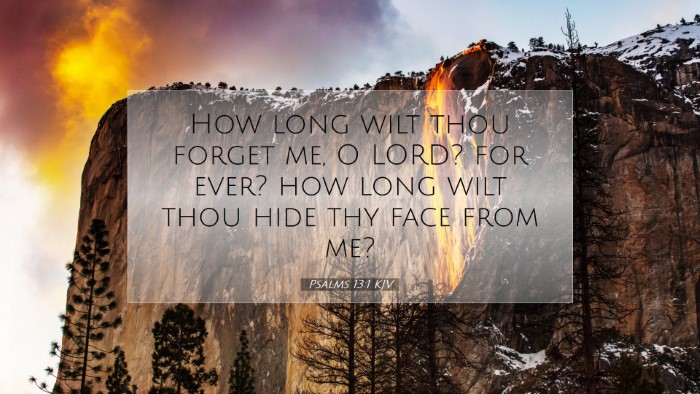Psalms 13:1 Commentary
Verse: "How long, O Lord? Will You forget me forever? How long will You hide Your face from me?" (Psalm 13:1)
Introduction
This poignant psalm written by David encapsulates a deep, personal plea of anguish and longing. It is an expression of despair often felt in the believer’s walk with God. David's cry resonates with many who have experienced periods of spiritual dryness or isolation from God.
Contextual Overview
The lament found in Psalm 13 serves as a microcosm of the broader human experience. David, facing adversities and perhaps a sense of abandonment, questions the apparent absence of God in his troubles. This yearning for divine presence reflects the universal struggle for faith amid adversity and doubt.
Insight from Matthew Henry
Matthew Henry notes that David begins this psalm with a profound sense of distress, questioning the duration of his suffering and perceived divine neglect. He emphasizes that the phrase "Will you forget me forever?" suggests David's internal conflict—his emotional turmoil leads him to feel forsaken despite God's promises. Henry suggests that such laments are part of a believer's relationship with God, indicating that questioning God is not in itself sinful but rather a pathway to deeper faith.
Albert Barnes' Analysis
Albert Barnes elaborates on the spiritual implications of feeling abandoned by God. He observes that David's cry, "How long?" indicates not only impatience but also a yearning for assurance of God’s favor. Barnes interprets the “hiding of God’s face” as a metaphor for spiritual desolation, highlighting the critical understanding that the absence of God's visible presence creates a heavy burden on the faithful. He reassures readers that such spiritual trials can eventually lead to a renewed sense of closeness to God, as they encourage believers to seek God earnestly.
Adam Clarke’s Exposition
Adam Clarke offers a detailed examination of the individual phrases within the verse. He suggests that the repetition of “How long?” underscores the intensity of David's suffering. Clarke points out the importance of the emotional pleading in prayer and worship, as believers sometimes encounter prolonged periods of silence from God. Clarke assures that God’s seeming delays are often purposeful, aimed at fostering spiritual growth and reliance on divine timing.
Theological Reflection
The struggle depicted in Psalms 13:1 invites readers to reflect on the nature of faith. The lamentation serves as a theological testimony that believers may endure seasons of doubt. This text resonates with the New Testament understanding of faith being the assurance of things hoped for, even when the tangible evidence is lacking, as noted in Hebrews 11:1. The key takeaway is that God is present even in silence, an assertion supported by the testimonies of David, Job, and the Apostle Paul throughout their difficulties.
Practical Application
For pastors, students, and scholars, Psalms 13:1 can serve as a powerful reminder to embrace the full spectrum of human emotion in worship and prayer. Rather than shying away from moments of doubt and despair, this psalm encourages sincerity in one’s relationship with God. In ministry, it is crucial to remember that congregants may experience times of feeling distant from God and to provide them with the assurance that they are not alone in their struggles.
- Encourage Honest Prayer: Facilitate an environment where believers feel safe to express their doubts and fears.
- Cultivate Patience: Remind congregants of God’s timing and purpose during spiritual dry spells.
- Highlight God’s Faithfulness: Use testimonies and scripture to affirm God’s enduring presence and faithfulness, even amid trials.
Conclusion
Psalms 13:1 is more than a cry of anguish; it is an invitation to engage authentically with God through our deepest struggles. The insights from Matthew Henry, Albert Barnes, and Adam Clarke provide a rich tapestry of understanding that speaks to the hearts of those in ministry and study. By embracing the full life of faith, including the valleys of despair, we can find a deeper connection to God and a more profound witness to His faithfulness.


